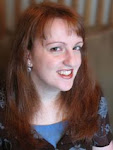Then, a month or so ago, I was lucky enough to win an
Advanced Readers Copy of Trent’s most recent novel, DIVIDED
WE FALL (which hits bookshelves today), through a Goodreads contest. I’m so
pleased to say that I’ve enjoyed all of Trent’s books, and I’m absolutely
thrilled to be able to interview him here on Bookshop Talk.
A bit about Trent:
For more about the fabulous Trent Reedy, visit his website
by clicking here. For a recent podcast
that features Trent Reedy chatting with Cheryl Klein and James Monohan about
his books and a few of his writing techniques, check out The Narrative
Breakdown by clicking on this link
(For all you writers out there, The Narrative Breakdown is the bee’s knees when
it comes to helpful hints and writing-related discussion.). Also, don’t miss this
video of a recent CBS This Morning interview with Trent and author
Katherine Paterson (who was instrumental in Trent’s decision to write WORDS IN
THE DUST).
Now, on to today’s interview!
Kim Harris Thacker: Your first novel, WORDS IN THE DUST, is
the story of Zulaikha, a young Afghan girl with a cleft lip. Not only must
Zulaikha cope with her peers’ cruel taunts, but she must also endure the many
limitations her culture imposes upon her and upon other Afghan women. A real
girl, also named Zulaikha, whom you met during your service with the U.S. Army
in Afghanistan, inspired the tale, which is delivered through first-person
narration. Some critics would call this set-up a rather bold one for a writer
who is an adult American male; yet reviewers of this novel (myself included)
have consistently been impressed by the believability of Zulaikha’s voice. Can
you share with us some of the experiences in your life that prepared you to be
able to empathize with Zulaikha to the point where you could write about her
struggles so convincingly?
Trent Reedy: I certainly understand the how seemingly
unlikely it is for a guy like me to write from the perspective of a young
Afghan girl. Choosing to do so was not a
decision I made lightly. However, I had
promised the real Zulaikha that I would tell her story, and I felt like I could
not let her down, especially since it seemed to me that so many Afghan girls
had already been let down by a number of difficult circumstances. Still, I had my doubts about whether or not I
could or even if I should write the book.
When I expressed these doubts to my friend Katherine Paterson, however,
she told me she thought I should at least try to write the book. That was all the permission I needed.
Perhaps I was able to write from Zulaikha’s perspective
because prior to my deployment I had relatively few experiences in my life that
prepared me to be able to empathize with Zulaikha. Throughout my time in Afghanistan, I was
continually shocked and surprised by the things I saw there. I saw the lingering results of the brutal ten
year Soviet occupation. I saw people
struggling with few resources and a land with very little modern
infrastructure. But I also encountered a
brave, kind, hardworking people. I
witnessed their hope for something better for themselves and for their children. I watched them begin to rebuild, slowly at
first, but then more and more. I saw
Afghan people, especially women and girls, dare to dream again.
I was prepared for none of this, and so I think the life
changing nature of the experience compelled me to write from Zulaikha’s point
of view.
KHT: On your website, in the “Story Behind the Story”
section for WORDS IN THE DUST, you divulge with admirable honesty that before
your deployment to Afghanistan, you believed that the people of that country,
as a whole, were responsible for the 9-11 attacks on the United States. You go
on to explain that you realized your belief was in error once you began
associating with and working with Afghans. Was there any experience in
particular (that you’re willing to share, of course) that caused this change in
your beliefs? What other experiences can you share with us that surprised you
or caused you to change your worldview?
TR: I was set free from my anger and hatred by the Afghan
children. They’d come up to us all the
time asking for candy and soccer balls.
They’d happily gather around us like they were fans at a rock
concert. I’d give an Afghan child
something as simple as a pen, and he’d act like it was the greatest gift. Being around that, I couldn’t keep my anger
up. I had to admit that they were
innocent.
I was on guard duty one day when my fellow soldiers and I
were living in a small Afghan house in the middle of the city of Farah. Standing on the cement guard platform, I
could see over our high, front mud-brick wall.
A young girl and boy played across the street. The boy pulled a piece of yarn, dragging a
small cardboard box through the dust behind him. The girl pulled only a piece of yarn. She didn’t even have a box! These were probably their only toys. When I thought about how many toys I had
enjoyed as a child, even growing up with parents who were poor by American
standards, I looked at those Afghan children across the street and realized they
needed help, not just with toys, but with establishing schools, communications,
and transportation systems. The day I
saw those two children is the day I let go of my anger and took our
reconstruction mission to heart.
KHT: On your website, you talk about Afghanistan’s rich and
ancient literary tradition, the existence of which seems surprising, since
Afghan culture engenders so many restrictions on literacy. Is there any chance
that the incredible works you speak of will be lost to history? Stepping away
from speaking of Afghanistan specifically, do you have any ideas of how people
can help to preserve their own culture’s literary traditions?
TR: I was also surprised to learn about Afghanistan’s rich
and ancient literary tradition. I had
fallen for lies such as, “Those people have been fighting since the dawn of
time, and they’ll never stop” and “They’ve never had a civilized society, only
tribal warfare.” Tragically, I only
learned through research after my deployment that such statements are ridiculous. Afghanistan’s restrictions on art and
literature are merely a recent Taliban crime, and though the Taliban tried hard
to eradicate Afghanistan’s culture and cultural heritage, like all evil regimes
the world over, they failed. The United
State’s mission in Afghanistan is, in a way, the same as its mission against
Nazi Germany and the Soviet Union, a fight against cruel oppression.
Will Afghanistan’s literature, music, and art be lost to
history? As in past struggles to
preserve art, it will not be lost as long as at least one brave soul is
determined to save it. And I am thrilled
to continually hear not only about the preservation of Afghanistan’s past
works, but of the growing expansion of modern Afghan art, music, poetry,
fiction, and cinema. Though not as
powerful as in the late nineties, the threat from the Taliban still exists, so
creative people in modern Afghanistan literally risk their lives for their
arts. No gun, but a pen. No body armor, but a musical instrument. They are Afghanistan’s heroes. With them lies Afghanistan’s best hope.
This struggle is the same all over the world, and the
champions of the long fight are those who continue to write and paint and sing
and play. We preserve our own culture’s
literary traditions by continuing to explore them, to enjoy them, and through
our shared discussion about them. Thus,
in a very real sense, book bloggers are also a powerful force in the
preservation of our literary tradition.
We are blessed in America to enjoy a robust literary community,
both in the physical world and online, and I’m honored to be a small part of
that.
KHT: When you were deployed to Afghanistan, your wife sent
you a copy of Katherine Patterson’s BRIDGE
TO TERABITHIA. According to your website and the introduction to WORDS IN
THE DUST (which introduction was written by Katherine Patterson), after you
read the novel, you wrote to Ms. Patterson to let her know how much you
appreciated the story. And you two have been friends ever since! I love writing
to authors that I admire, too, and it always thrills me when they write back.
Can you tell us about the best bit of fan mail you’ve ever received?
I do not actually get much fan mail, and that’s okay. I’d much rather my readers use their time to
read more books. However, I am always
delighted to hear from those who have read my novels. One letter that stands out in my mind came
from a young girl whose parents moved to America from Afghanistan. She said something like, “Thank you for
writing a book that shows people that not all Afghans are bad.” I read that and nearly wept. What must this girl have had to deal with in
her life that made her need a book with that message? What unfair assumptions has she faced simply
because her parents chose to flee the wars in Afghanistan to seek peace and
opportunity in America? I wrote back to
this girl, offering all the encouragement I could, honored that my book offered
her some help.
KHT: So far, you’ve written your books using two different
points of view: DIVIDED WE FALL (which, readers, is the first book in a
trilogy!) and WORDS IN THE DUST are told from a first-person POV; your second
novel, STEALING AIR, is told from a third-person POV. Which point of view—omniscient
or first-person—has been easiest to write in, and why do you think that’s the
case?
First-person is the easiest for me. People warn writers about first-person,
saying that it is limiting, but I find that limitation to be liberating. Because I know that the story can only be
told through one person’s experience, I do not have to worry about awkward and
confusing POV jumps as I might if I were writing an omniscient perspective.
First person also allows me a greater feeling for my
protagonist. I can more effectively
understand who he is and how he thinks and feels about life when I essentially
act him out through first-person POV.
KHT: STEALING AIR is about a new kid, Brian, who forms a
strong friendship with two other boys, Alex and Max. Max is quite the genius,
and has even built a type of aircraft, which he calls Blackbird. In order to
research how Max might have built Blackbird, you state on your website that you
tinkered around with Legos until you came up with a likely aircraft of your own.
I call that some fun, hands-on research! As a matter of fact, it would appear
that much of your research for your novels is of the hands-on variety: You
lived and worked in Afghanistan, and WORDS IN THE DUST is about an Afghan girl;
you were a member of the National Guard, and the “Divided We Fall” trilogy is
about a young man who is in the National Guard, too. Is hands-on research your
favorite type of research to conduct when novel writing? What other kinds of
research do you do in order to write your books?
TR: To the greatest extent possible, I try to experience the
events of my novels firsthand. I like to
walk around in places where my novels are set, to take in the sights, sounds,
and smells of my characters’ world. It’s
absolutely my favorite type of research.
It allows me to play with Legos all day, as in the case of my work on Stealing Air. It means I get to go have fun (while taking
notes) at a great rodeo in northern Idaho.
Being a writer is the best job in the universe, because most days, I get
to stay home and dream and pretend on the page, but lots of times I get to go
out in the world and explore.
In terms of other research, in addition to checking websites
for quick facts, I read a lot of books about topics related to my novels. Recently, I’ve been spending a lot of time on
YouTube, trying to get a sense of the rhythm of various broadcast journalism
entities to help me write the media sections for Divided We Fall.
KHT: Many of the online reviews of STEALING AIR state that
this is the perfect book for boys or for reluctant readers. “Boys” and
“Reluctant Readers” are often lumped together, as if they are, in fact, one and
the same group. What are your thoughts about this? Do you have any ideas of
things we can do to help reluctant readers—male and/or female—to become strong
readers?
TR: This question opens up a huge topic, one that has easily
been the subject of entire books, so I worry that whatever answer I provide
here will be woefully inadequate. First,
I am bothered by the trend in literature for young people whereby books are
labeled “boy books” or “girl books” and where boys are so often labeled
“reluctant readers.” Someday, I might
carefully, and at some length, lay out my thoughts and experiences with these
topics.
For now, I’ll say that I think a lot of middle grade books
are what I casually call “feelings books.”
Feelings books are stories about characters with dead siblings or
missing parents or some other very emotional topic, stories with hope, but
often with a lot of sadness. I love
feelings books. Katherine Paterson’s Bridge To Terabithia was one such book
that saved my life. Words in the Dust is a feelings book.
I wonder if it is possible that most middle grade novels are
feelings books. And I wonder if a lot of
boys have been trained, not to be without feelings, but at least to crave a
little more action. Sometimes when I’m
reading, I just want to rock. I want a
faster paced adventure, where I’m reading not as much to learn some insight
into human feelings, but to soar through the air or explore the spooky ruins of
some ancient temple. I wrote Stealing Air as something fun for middle
grade boys and girls. I’ve been blessed
with quite a few e-mails from young boys who say it’s their favorite book, or
that they had so much fun reading it.
They often ask for a sequel.
I think librarians know, perhaps more than any of us, how
helping reluctant readers become strong readers is, and has always been, a
matter of matching the right book with the right young person. For me, the novel that turned it all around
in the fourth grade was Tamora Pierce’s Alanna:
The First Adventure. Tamora would be
upset with me if I called it a “girl’s book,” but surely some have deemed it
so. Back then, I didn’t care how the
book was labeled. I just saw that cover
with the girl looking up at that incredible sword, and I knew that blade held
infinite potential for adventure.
It’s about stories, not boys or girls or reluctant readers
or strong readers. It’s always been
about the stories.
KHT: You say on your website that you’ve always found flying
fascinating. What other interests do you have, and can we expect any future novels
about any of them?
TR: I’m interested in a lot of things, and it would be
impossible for me to keep my interests out of my future novels.
I have a complicated interest in sports and in football in
particular that will feature prominently in my fall, 2014 release, a YA novel
called If You’re Reading This. That novel also incorporates my experiences
and thoughts about Afghanistan. It’s
going to be quite unique.
I also love science fiction, and so I’m eager to write about
those elements, though I’m not quite sure how I’ll approach that yet.
I’m having fun building a sailing ship out of Legos, and I
have some fun ideas for working that into a fantasty/sci-fi novel.
The great thing about being a writer is that I never know
where it will take me next.
KHT: STEALING AIR deals quite a lot with bullying, as does
WORDS IN THE DUST. I think books about this subject are so incredibly important
for kids to read, since bullying is such an issue in schools (and elsewhere)
today. Are there any other books that deal heavily with bullying that you can
recommend?
TR: One of the many great things about literature for young
people is that it offers helpful perspectives on a number of issues, and of
course lately there has been a great effort to help young people deal with
cruelty.
I’d recommend Thirteen
Reasons Why by Jay Asher as well as an anthology of short stories called Dear Bully, edited by Megan Kelley Hall
and Carrie Jones
KHT: Your newest novel, DIVIDED WE FALL, features a young
man who is enlisted in the Idaho National Guard, and much of the story takes
place in northern Idaho. I live in northern Idaho, myself (though I’m a Wyoming
girl, through and through). What made you choose Idaho?
TR: I chose Idaho as the setting for Divided We Fall for a number of reasons. First, the state is absolutely
beautiful. I only recently moved to the
Inland Northwest from Iowa, and I’ve been delighted with this region. More importantly, I knew that Divided We Fall was going to be about a
stand-off between a state and the federal government. I had to think of a plausible way that a
state could hold out against the Fed’s power.
Idaho offers a rugged terrain that could provide a natural defense
against invasion. Finally, Idaho is a
fiercely independent state. It’s
legislature has experimented with nullification as a means of stopping federal
legislation with which they disagreed.
Idaho is generally very in favor of Second Amendment rights. All of these elements made Idaho the ideal
place to set a novel like Divided We Fall.
KHT: How was the experience/process of writing DIVIDED WE
FALL, which is a young adult novel, different from writing WORDS IN THE DUST
and STEALING AIR, which are middle grade?
TR: The writing process is different with each novel, so
much so that it is less productive, I think, to talk about the differences
between writing middle grade and young adult novels.
I will say that Divided
We Fall might have been the best writing experience I’ve ever had. Never before has a character been so clear to
me as was Danny Wright. I wrote the
novel in a very short time, with revisions also progressing quickly. I had fun with the entire process, and I’m
very happy with the book that resulted from it.
I’m eager to hear what readers have to say about Divided We Fall.
KHT: Of all the characters in all your novels, whom do you
relate to the most? How about the least?
TR: This is going to sound like a politician’s answer, but
after giving this question some thought, I keep coming to the same
conclusion. With very few exceptions, I
think I relate to nearly all the characters in Divided We Fall. I have to
relate to them in some way for me to be able to write them. At times I feel adventurous like Danny, and
at other moments I’m more subdued like Becca.
Sometimes I favor a harder approach like Senate Majority Leader Laura
Griffith, but I also sometimes favor a more cautious attitude like President
Rodriguez. To make characters people can
enjoy and relate to, I have to find some level upon which I can relate to those
characters.
KHT: Finally, one of my favorite questions to ask in author
interviews: What are some of your favorite books?
TR: The toughest
question is saved for last!
We are blessed to
live in a time when there are more authors producing more great books than ever
before, and this is particularly true in the realm of literature for young
people. This is really a golden age for
books. Unfortunately, this golden age
makes this question rather difficult to answer.
I don’t think there’s enough memory on the entire Internet for me to
list all my favorite books. I’ll list
five here, but by doing so, I’m betraying 1.7 guagazillion other fantastic
books that I love.
Bridge to Terabithia by Katherine Paterson
The Great Gatsby
by F. Scott Fitzgerald
The Things They Carried by Tim O’Brien
Ghost Ship to Ganymede by Robert Swindells
The Poetry of Robert Frost
by...Robert Frost. Who else?
Thank you so much, Trent, for joining us here on Bookshop
Talk! Congratulations on your success as an author, and congratulations on the
release of a brand new book, today!
Readers, if you live in or within driving distance to the
Spokane, WA area, hop over to Auntie’s
Bookstore on February 1st for the DIVIDED WE FALL launch party! Rumor
has it that you’ll get to hear Trent sing... You can find more information
about the launch here.


























